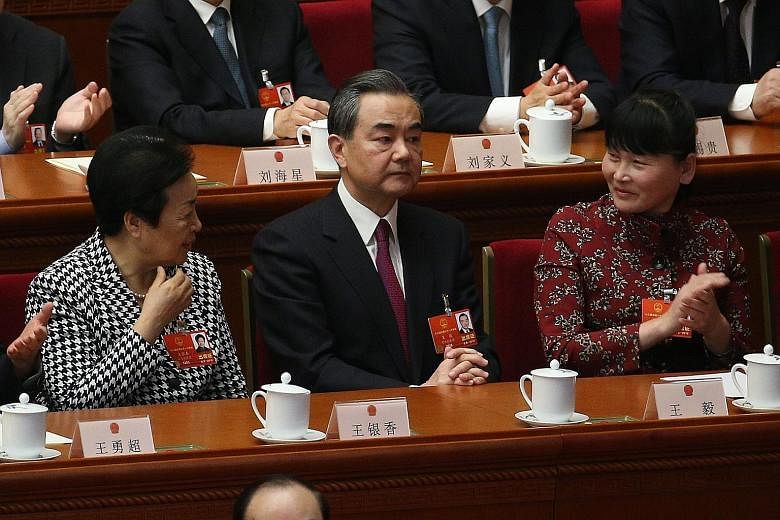In a sign that China is strengthening its foreign affairs team, Foreign Minister Wang Yi has been promoted to state councillor while retaining his current portfolio.
His elevation to a position just below that of vice-premier comes just days after highly capable former anti-corruption czar Wang Qishan was named vice-president, likely with a brief involved in foreign policy matters.
Last October, outgoing state councillor Yang Jiechi, who is deputy head of the Chinese Communist Party's (CCP) policymaking Leading Group on Foreign Affairs, was promoted to the powerful 25-member Politburo of the party.
These moves to give heft to the foreign affairs apparatus come as China is playing a bigger role on the world stage and as its external environment is becoming more difficult, with the perception of China as a threat gaining ground again.
Mr Wang, 64, was appointed to his posts yesterday together with other members of the State Council, or Cabinet, at the annual session of the National People's Congress, or Parliament. His appointment as state councillor was a recognition of his performance as foreign minister, said Associate Professor Li Mingjiang of the S. Rajaratnam School of International Studies, adding that it showed Beijing wants to elevate the foreign policy apparatus in the party and government structure.
He expected that Mr Yang, in his capacity as deputy head of the foreign affairs leading group, would help coordinate state and party organs in foreign affairs matters.
Foreign Ministry spokesman Hua Chunying told a regular briefing yesterday that the CCP was the authority in Chinese diplomacy and that Mr Yang would "continue to play an important role in foreign affairs".
Prof Li noted that there was a need for a strong foreign affairs apparatus with "the rise of China, its enhanced presence in many parts of the world and more active involvement in global governance issues". This is particularly so as President Xi Jinping's agenda to make China great again includes making it prominent in international affairs, he added.
Another reason foreign policy is growing in importance for China, said Professor Zheng Yongnian, director of the East Asian Institute, is that the external environment is becoming more difficult for Beijing.
He noted that the United States has begun to regard China, together with Russia, as a main threat and that it has revived a dialogue with India, Australia and Japan that has both a security and an economic dimension, including an alternative to China's Belt and Road Initiative.
However, he thought it was not enough to pick a few good men for the job of conducting foreign affairs. There needs to be a "whole effective bureaucracy". He said it would be "wonderful" if Mr Wang's job would be to reorganise the foreign affairs team and not just to handle the complicated China-US relations.
Now, there is poor coordination between different parts of the party and government dealing with foreign affairs, he noted. "China has to reform its foreign policy practice."

